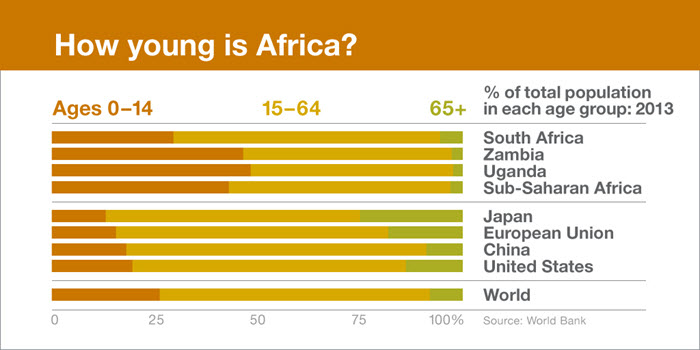Almost without a doubt, the continent’s youth will be a major contributor. As the graph above shows, the percentage of the population in Sub-Saharan Africa under the age of 14 is much higher than other regions and the world average. South Africa, with a relatively mature population compared to its neighbors, still skews quite young by world standards. Meanwhile, according to the U.N., Uganda’s approximately 35 million people have a median age of just 15.9, the youngest in the world.
The implications of Africa’s age demographics are numerous, and likely will have a significant impact on the world economy and global food security in the decades to come. The U.N. estimates that 17 million youth in Sub-Saharan Africa enter the job market every year. Many of these young workers are moving from rural areas to rapidly growing cities in pursuit of better livelihoods, giving the region an urbanization rate that is twice the world average. Today, about 40 percent of Africans live in cities, but that number is projected to pass 50 percent by 2030. Societies likely will face social and economic challenges in response to this migration. The continent will need to produce much more food as hundreds of millions of Africans cross into their early adult years, the time of life when people consume the highest number of calories.
 What engine will drive Africa’s future?
What engine will drive Africa’s future?
Almost without a doubt, the continent’s youth will be a major contributor. As the graph above shows, the percentage of the population in Sub-Saharan Africa under the age of 14 is much higher than other regions and the world average. South Africa, with a relatively mature population compared to its neighbors, still skews quite young by world standards. Meanwhile, according to the U.N., Uganda’s approximately 35 million people have a median age of just 15.9, the youngest in the world.
The implications of Africa’s age demographics are numerous, and likely will have a significant impact on the world economy and global food security in the decades to come. The U.N. estimates that 17 million youth in Sub-Saharan Africa enter the job market every year. Many of these young workers are moving from rural areas to rapidly growing cities in pursuit of better livelihoods, giving the region an urbanization rate that is twice the world average. Today, about 40 percent of Africans live in cities, but that number is projected to pass 50 percent by 2030. Societies likely will face social and economic challenges in response to this migration. The continent will need to produce much more food as hundreds of millions of Africans cross into their early adult years, the time of life when people consume the highest number of calories.
But Africa’s young people also will do the work that moves the continent forward. According to a McKinsey study from 2012, as fertility rates in Africa continue to decline, the working-age segment of the population will see the highest rates of growth, spurring gains in productivity as the ranks of youth enter their most industrious years. Over time, rising wages in cities likely will buoy rural incomes as well, as urban consumers are able to spend more on food products that rural farmers provide, and rural to urban migration reduces surpluses of labor in rural areas. Nations will need to pursue partnerships that help build strong value chains from the rural farm to the urban fork.
What other reasons are there for optimism? In addition to the fact that this process of development resembles the successful path taken by countries like the U.S., Brazil and China during the past century, the greatest reason to be upbeat may be Africans’ own positivity. The McKinsey study found that Africans are among the most hopeful people on the planet, with 84 percent believing they will be better off in two years than they are today. Call it the optimism of youth.
As part of our 150th anniversary and our commitment to helping the world thrive, Cargill is convening an Africa Learning Journey in June 2015 to explore solutions to food security challenges on the continent. Read more at: Africa Learning Journey.

